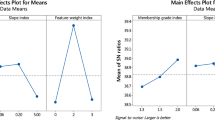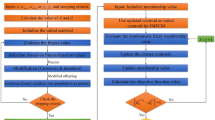Abstract
Clustering for mixed numerical and categorical attributes has attracted many researchers due to its necessity in many real-world applications. One crucial issue concerned in clustering mixed data is to select an appropriate distance metric for each attribute type. Besides, some current clustering methods are sensitive to the initial solutions and easily trap into a locally optimal solution. Thus, this study proposes a local search genetic algorithm-based possibilistic weighted fuzzy c-means (LSGA-PWFCM) for clustering mixed numerical and categorical data. The possibilistic weighted fuzzy c-means (PWFCM) is firstly proposed in which the object-cluster similarity measure is employed to calculate the distance between two mixed-attribute objects. Besides, each attribute is placed a different important role by calculating its corresponding weight in the PWFCM procedure. Thereafter, GA is used to find a set of optimal parameters and the initial clustering centroids for the PFCM algorithm. To avoid local optimal solution, local search-based variable neighborhoods are embedded in the GA procedure. The proposed LSGA-PWFCM algorithm is compared with other benchmark algorithms based on some public datasets in UCI machine learning repository to evaluate its performance. Two clustering validation indices are used, i.e., clustering accuracy and Rand index. The experimental results show that the proposed LSGA-PWFCM outperforms other algorithms on most of the tested datasets.




Similar content being viewed by others
References
Tan P-N, Steinbach M, Kumar V (2006) Introduction to data mining. Pearson education Inc
Kuo R-J, Amornnikun P, Nguyen TPQ (2020) Metaheuristic-based possibilistic multivariate fuzzy weighted c-means algorithms for market segmentation. Appl Soft Comput 96:1–14
Diday E, Govaert G, Lechevallier Y, Sidi J (1981) Clustering in pattern recognition. Digital image processing. Springer, pp 19–58
Horn D, Gottlieb A (2001) Algorithm for data clustering in pattern recognition problems based on quantum mechanics. Phys Rev Lett 88:1–4
Allahyari M, Pouriyeh S, Assefi M, Safaei S, Trippe ED, Gutierrez JB, Kochut K (2017) A brief survey of text mining: classification, clustering and extraction techniques. arXiv e-print, arXiv:170702919.
Farhang Y (2017) Face extraction from image based on K-means clustering algorithms. Int J Adv Comput Sci Appl 8:96–107
Taghva K, Veni R (2010) Effects of similarity metrics on document clustering. In: Information technology: 2010 IEEE 7th international conference on new generations (ITNG), pp 222–226
Loohach R, Garg K (2012) Effect of distance functions on k-means clustering algorithm. Int J Comput Appl 49:7–9
Kuo R, Nguyen TPQ (2019) Genetic intuitionistic weighted fuzzy k-modes algorithm for categorical data. Neurocomputing 330:116–126
Esbensen KH, Guyot D, Westad F, Houmoller LP (2002) Multivariate data analysis: in practice: an introduction to multivariate data analysis and experimental design. Aalborg University, Aalborg, Denmark
Behzadi S, Ibrahim MA, Plant C (2018) Parameter free mixed-type density-based clustering. In: International conference on database and expert systems applications. Springer, pp 19–34
Huang Z (1997) Clustering large data sets with mixed numeric and categorical values. In: Proceedings of the 1st Pacific-Asia conference on knowledge discovery and data mining (PAKDD). Singapore, pp 21–34
Ji J, Pang W, Zhou C, Han X, Wang Z (2012) A fuzzy k-prototype clustering algorithm for mixed numeric and categorical data. Knowl Based Syst 30:129–135
Ahmad A, Dey L (2007) A k-mean clustering algorithm for mixed numeric and categorical data. Data Knowl Eng 63:503–527
Chatzis SP (2011) A fuzzy c-means-type algorithm for clustering of data with mixed numeric and categorical attributes employing a probabilistic dissimilarity functional. Expert Syst Appl 38:8684–8689
Jia H, Cheung Y-M (2018) Subspace clustering of categorical and numerical data with an unknown number of clusters. IEEE Trans Neural Netw Learn Syst 29:3308–3325
Zhang K, Wang Q, Chen Z, Marsic I, Kumar V, Jiang G, Zhang J (2015) From categorical to numerical: multiple transitive distance learning and embedding. In: Proceedings of the 2015 SIAM international conference on data mining. SIAM, pp 46–54
Chen W, Chen Y, Mao Y, Guo B (2013) Density-based logistic regression. In: Proceedings of the 19th ACM SIGKDD international conference on knowledge discovery and data mining. ACM, pp 140–148
Li C, Biswas G (2002) Unsupervised learning with mixed numeric and nominal data. IEEE Trans Knowl Data Eng 14:673–690
Ralambondrainy H (1995) A conceptual version of the K-means algorithm. Pattern Recognit Lett 16:1147–1157
He Z, Xu X, Deng S (2005) Scalable algorithms for clustering large datasets with mixed type attributes. Int J Intell Syst 20:1077–1089
Luo H, Kong F, Li Y (2006) Clustering mixed data based on evidence accumulation. In: International conference on advanced data mining and applications. Springer, pp 348–355
Hsu C-C, Chen C-L, Su Y-W (2007) Hierarchical clustering of mixed data based on distance hierarchy. Inf Sci 177:4474–4492
Liang J, Zhao X, Li D, Cao F, Dang C (2012) Determining the number of clusters using information entropy for mixed data. Pattern Recognit 45:2251–2265
Cheung Y-M, Jia H (2013) A unified metric for categorical and numerical attributes in data clustering. In: Pacific-Asia conference on knowledge discovery and data mining. Springer, pp 135–146
Ahmad A, Khan S (2019) A survey of state-of-the-art mixed data clustering algorithms. IEEE Access 7:31883–31902
Pal NR, Pal K, Keller JM, Bezdek JC (2005) A possibilistic fuzzy c-means clustering algorithm. IEEE Trans Fuzzy Syst 13:517–530
Bezdek JC, Ehrlich R, Full W (1984) FCM: The fuzzy c-means clustering algorithm. Comput Geosci 10:191–203
Goldberg DE (1989) Genetic algorithms in search, optimization and machine learning. Addison-Wesley Longman Publishing Co., Inc.
Lee CKH (2018) A review of applications of genetic algorithms in operations management. Eng Appl Artif Intell 76:1–12
Lee NK, Li X, Wang D (2018) A comprehensive survey on genetic algorithms for DNA motif prediction. Inf Sci 466:25–43
Dai T, Ni L, Luo Q (2020) Diagnosis method of ultrasonic elasticity image of peripheral lung cancer based on genetic algorithm. Neural Comput Appl 32:18315–18325
Guo K, Yang M, Zhu H (2020) Application research of improved genetic algorithm based on machine learning in production scheduling. Neural Comput Appl 32:1857–1868
Mohammadrezapour O, Kisi O, Pourahmad F (2020) Fuzzy c-means and K-means clustering with genetic algorithm for identification of homogeneous regions of groundwater quality. Neural Comput Appl 32:3763–3775
García-Martínez C, Lozano M (2007) Local search based on genetic algorithms. In: Advances in metaheuristics for hard optimization. Springer, pp 199–221
Coello CACC, Pulido GT (2001) A micro-genetic algorithm for multiobjective optimization. In: International conference on evolutionary multi-criterion optimization. Springer, pp 126–140
Kazarlis SA, Papadakis SE, Theocharis J, Petridis V (2001) Microgenetic algorithms as generalized hill-climbing operators for GA optimization. IEEE Trans Evol Comput 5:204–217
Li C-L, Sun Y, Zhang L, Wang X-C (2005) A parallel micro-genetic algorithm and its application. In: 2005 International conference on machine learning and cybernetics. IEEE, pp 2880–2884
Santiago A, Dorronsoro B, Fraire HJ, Ruiz P (2021) Micro-genetic algorithm with fuzzy selection of operators for multi-Objective optimization: μFAME. Swarm Evol Comput 61:100818
Ombuki BM, Ventresca M (2004) Local search genetic algorithms for the job shop scheduling problem. Appl Intell 21:99–109
Asadzadeh L (2015) A local search genetic algorithm for the job shop scheduling problem with intelligent agents. Comput Ind Eng 85:376–383
Dengiz B, Altiparmak F, Smith AE (1997) Local search genetic algorithm for optimal design of reliable networks. IEEE Trans Evol Comput 1:179–188
Liu D, Jin D, Baquero C, He D, Yang B, Yu Q (2013) Genetic algorithm with a local search strategy for discovering communities in complex networks. Int J Comput Intell Syst 6:354–369
Gharsalli L, Guérin Y (2019) A hybrid genetic algorithm with local search approach for composite structures optimization. In: Proceedings of the European conference for aeronautics and space sciences.
Li X, Gao L (2016) An effective hybrid genetic algorithm and tabu search for flexible job shop scheduling problem. Int J Prod Econ 174:93–110
Yun Y (2006) Hybrid genetic algorithm with adaptive local search scheme. Comput Ind Eng 51:128–141
Baareh A (2013) A hybrid memetic algorithm (genetic algorithm and tabu local search) with back-propagation classifier for fish recognition. Int Rev Comput Softw 8:1287–1293
Mohammadpour T, Bidgoli AM, Enayatifar R, Javadi HHS (2019) Efficient clustering in collaborative filtering recommender system: hybrid method based on genetic algorithm and gravitational emulation local search algorithm. Genomics 111:1902–1912
Derbel H, Jarboui B, Hanafi S, Chabchoub H (2012) Genetic algorithm with iterated local search for solving a location-routing problem. Expert Syst Appl 39:2865–2871
Sabar NR, Song A, Zhang M (2016) A variable local search based memetic algorithm for the load balancing problem in cloud computing. In: European conference on the applications of evolutionary computation. Springer, pp 267–282
Vavak F, Jukes K, Fogarty TC (1998) Performance of a genetic algorithm with variable local search range relative to frequency of the environmental changes. Genetic Programming, pp 22–25
Vavak F, Jukes K, Fogarty TC (1997) Adaptive balancing of a bank of sugar-beet presses using a genetic algorithm with variable local search range. In: 3rd Intl Mendel Conference on Genetic Algorithms, Citeseer, pp 164–169
Zhang G, Zhang L, Song X, Wang Y, Zhou C (2019) A variable neighborhood search based genetic algorithm for flexible job shop scheduling problem. Cluster Comput 22:11561–11572
Li X, Gao L, Pan Q, Wan L, Chao K-M (2018) An effective hybrid genetic algorithm and variable neighborhood search for integrated process planning and scheduling in a packaging machine workshop. IEEE Trans Syst Man Cybern Syst 49:1933–1945
Xia H, Li X, Gao L (2016) A hybrid genetic algorithm with variable neighborhood search for dynamic integrated process planning and scheduling. Comput Ind Eng 102:99–112
García-Martínez C, Lozano M (2010) Evaluating a local genetic algorithm as context-independent local search operator for metaheuristics. Soft comput 14:1117–1139
Michielssen E, Ranjithan S, Mittra R (1992) Optimal multilayer filter design using real coded genetic algorithms. IEE Proc J-Optoelectron 139:413–420
Hansen P, Mladenović N (2003) Variable neighborhood search. In: Handbook of metaheuristics. Springer, pp 145–184
Lu Y, Cao B, Rego C, Glover F (2018) A Tabu Search based clustering algorithm and its parallel implementation on Spark. Appl Soft Comput 63:97–109
Heloulou I, Radjef MS, Kechadi MT (2017) A multi-act sequential game-based multi-objective clustering approach for categorical data. Neurocomputing 267:320–332
Hoffman M, Steinley D, Brusco MJ (2015) A note on using the adjusted Rand index for link prediction in networks. Soc Networks 42:72–79
Zhao X, Cao F, Liang J (2018) A sequential ensemble clusterings generation algorithm for mixed data. Appl Math Comput 335:264–277
Ahmad A, Khan SS (2021) initKmix-A novel initial partition generation algorithm for clustering mixed data using k-means-based clustering. Expert Syst Appl 167:114149
Acknowledgements
This research is funded by Funds for Science and Technology Development of the University of Danang under Project Number B2020-DN02-83.
Author information
Authors and Affiliations
Corresponding author
Ethics declarations
Conflict of interest
The authors declare that there is no conflict of interest.
Additional information
Publisher's Note
Springer Nature remains neutral with regard to jurisdictional claims in published maps and institutional affiliations.
Rights and permissions
About this article
Cite this article
Nguyen, T.P.Q., Kuo, R.J., Le, M.D. et al. Local search genetic algorithm-based possibilistic weighted fuzzy c-means for clustering mixed numerical and categorical data. Neural Comput & Applic 34, 18059–18074 (2022). https://doi.org/10.1007/s00521-022-07411-1
Received:
Accepted:
Published:
Issue Date:
DOI: https://doi.org/10.1007/s00521-022-07411-1




